How Did a Falafel House in Tennessee Become the Nicest Place in America?
Updated: Feb. 20, 2023
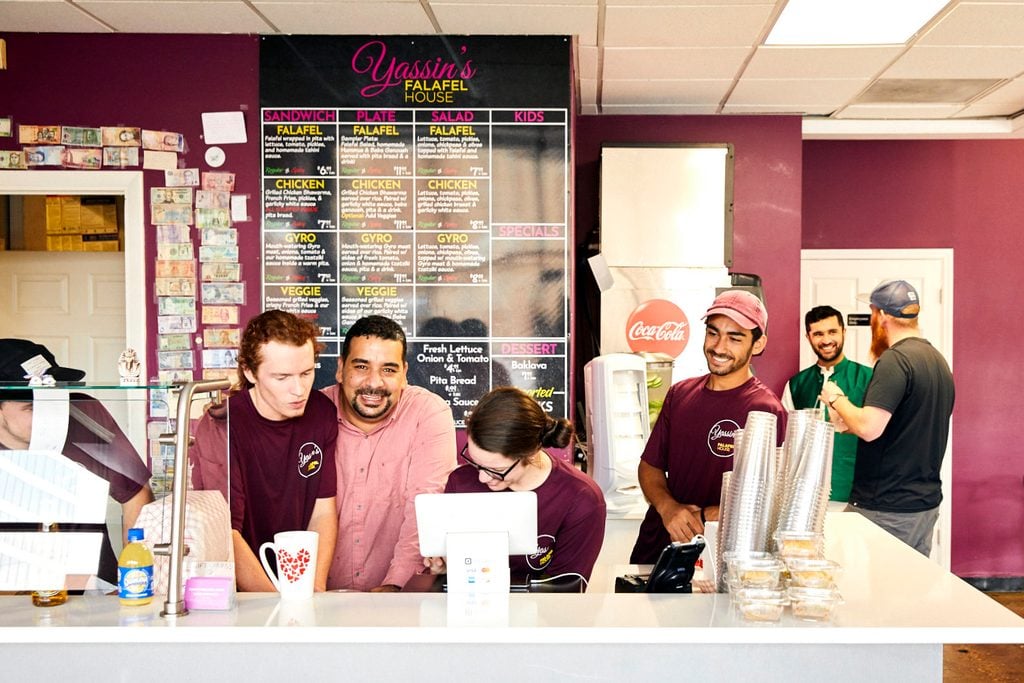
“I’m not here just to make falafel and make money. I’m here to build this community.”
Live in a place where people are nice and treat each other right? Tell us about it and your town could end up on the cover of Reader’s Digest!
Just a few days before Christmas 2017, dozens gathered at the Nativity scene at the First Baptist Church in downtown Knoxville, Tennessee, to march to nearby Market Square to hold a rally and a vigil to “welcome the stranger,” a Christian call to treat friends, neighbors, strangers and even enemies with love and compassion. One of the people there was Yassin Terou, a refugee who came to Knoxville in 2011 and has since become a beloved local celebrity.
But not beloved by all.
A man in the crowd draped in an American flag was yelling at anyone who would listen that immigrants were preventing him from getting a job. When it was Terou’s turn to speak at the rally, he invited the man up on stage so they could hold the flag high together. When the man refused, Terou went into the crowd to find him so he could introduce himself and offer to buy him dinner so they could talk.
He also offered the man a job. Terou is the owner and operator of Yassin’s Falafel House, which employs 30 people and has been open for the past four years.
“I always do that,” Terou told Reader’s Digest, “I always invite anyone who hates us to the store. I want them to know us more. When you break bread, you break hate.”
Terou is a refugee, an immigrant, and a Muslim. There are some places in the world where strangers aren’t welcomed, especially if they don’t look, talk, or worship like everyone else. But that’s not Knoxville, where Terou has been given a shot at the American dream. His restaurants are safe places for everyone, powerful engines of charity, and symbols of the best of America. That’s why Yassin’s Falafel House is this year’s Nicest Place in America.
“I’m not here just to make falafel and make money,” Terou said. “I’m here to build this community.
Serving Up Kindness
Terou is likely the first immigrant, refugee, or Muslim that many of his customers and fellow Knoxvillians have met—yet he embodies their closely held belief that all people are created equal and deserve a basic level of dignity and respect. He is also a reminder that these values aren’t good because they come from Knoxville; good people everywhere hold them.
While other Middle-Eastern restaurants have come and gone, Terou’s restaurant is popular and expanding. But the secret isn’t in the falafel.
“With Yassin’s, it’s the atmosphere,” said Mary Constantine, a food writer at the Knoxville News Sentinel. “It makes you feel good because he’s a good person and he’s good to his people and his family.”
At the downtown location, folks have made Yassin’s one of the most popular places to eat, and it isn’t just because of the deliciously fried chickpea balls served on a pita. Terou supports his customers and many of the causes important to them. In West Knoxville, which is more conservative than the city center, the store is even more popular and profitable. Why? It all comes down to Terou’s message, which is perfectly captured in the sign outside of each Yassin’s location:
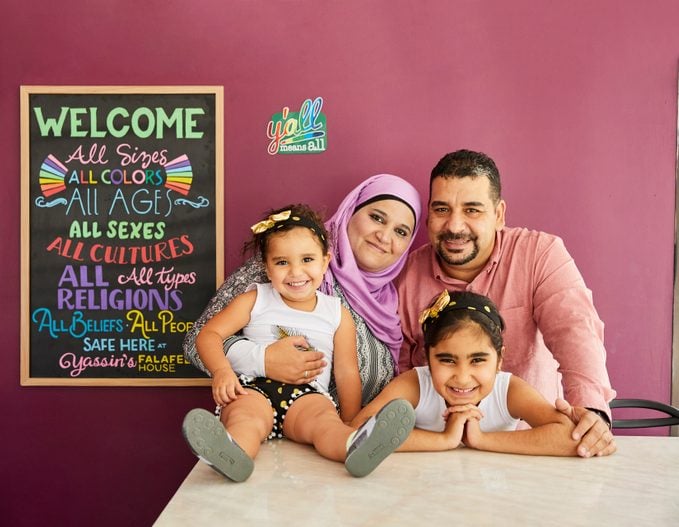
“At any given lunch hour, you’ll see what makes Yassin’s so special all for yourself: From power business leaders and tourists to Muslims and Christians, the breadth of our community are sharing meals together,” said Pastor Tom Ogburn, whose First Baptist Church is just blocks away from Yassin’s.
Changing Minds and Hearts
Yassin’s Falafel House is changing attitudes in Knoxville. For most people, war-ravaged regions like Syria seem far away, foreign, even scary. But Yassin’s, a place where food is shared, where community is formed, where kindness blooms, is a powerful symbol of the real people whose lives are being violently disrupted, potential squandered.
In January 2017, Terou was invited by the youth pastor at First Baptist to talk to a group of kids at an “in-home retreat,” a weekend of socializing and learning, this time about neighbors and how we should treat them. Terou went to his usual playbook and cooked the group a huge meal and then told them about his life.
“It revolutionized the way they think about their neighbors and refugees and what we should do as Americans, first of all, and as Christians to welcome all who need a place of refuge,” said Ben Winder, the youth pastor at First Baptist at the time (he left Knoxville this past summer to join a congregation in Alabama). “Prior to that weekend, some of our students and families thought of refugees as these folks who were in some way dangerous. I don’t think that can stick if you meet Yassin or meet other refugees like him, because you come to know the people they are.”
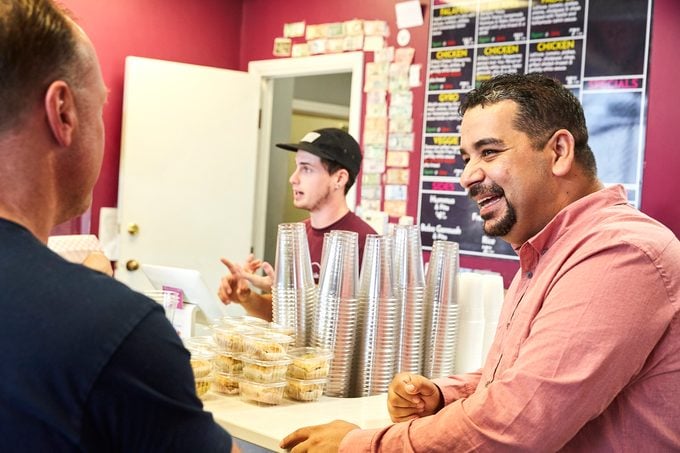
Welcome One, Welcome All
Drocella Mugorewera, executive director of Bridge Refugee Services, a non-profit in Knoxville that helps refugees rebuild their lives in Eastern Tennessee, repeats the word that’s often mentioned when talking about Terou: “He wants everybody to feel welcomed.”
Terou has worked with Bridge in hiring refugees, like Hunar Muhammed, to work in his restaurant. Muhammed fled violence from Northern Iraq’s Kurdistan region and came to Knoxville much like Terou had, without knowing any English and without a driver’s license. Now, he is the manager at Yassin’s when the boss is away, a fact he reveals with pride. Muhammed, like Terou, now sees it as his mission to give back to a place that has given so much to him.
“It’s my job to help people,” he said. “That’s how we can keep being nice and transfer love to our kids and our grandkids. If someone helps me, I don’t want to be the last one who has been helped.”
Terou, who now employs 30 people at his two locations, has also hired ex-convicts, people struggling with drug addiction, and women fleeing dangerous situations. The local YWCA, which provides shelter for 58 women who are overcoming addiction and other difficult situations, is right across the street. One of the biggest obstacles to recovery and independence is having a job that provides dignity and an income.
“Yassin’s has been an employer for many of our residents,” Karlyn Reel, director of public relations at the YWCA, told Reader’s Digest. “Terou’s willingness to hire those who have had different challenges is definitely appealing to us.”
Terou and all of his employees share this “pay-it-forward” attitude, making Yassin’s Falafel House a hub for charitable works.
In November 2016, fires ripped through the Smoky Mountain town of Gatlinburg, killing 14 and damaging or destroying 2,500 homes and businesses. The night of the worst suffering, Terou couldn’t sleep, worrying for the people of Gatlinburg, just an hour away. He stayed up until past midnight, texting with friends in the community about what to do. The next day, he rented a huge moving van and put the call out to his customers and friends to bring supplies to help the victims of the fire. By the early afternoon, the truck was loaded with water, food, and other essentials.
Yassin’s Falafel House has also held fundraisers for community causes, donating a percentage of the profits of each falafel sold. When fundraising for Bridge Refugee Services, the line was out the door and around the block; Yassin’s ran out of pita but didn’t stop selling food for the cause until everyone had been served.
When he won a local Rotary Club Peace Award in May 2018 for his charitable work, he donated the $1,000 prize to the Seeds of Abraham, a local nonprofit that brings together youth from different faiths to build connections that lead to understanding and peace.
In fact, Terou has been “paying-it-forward” ever since he arrived in Knoxville.
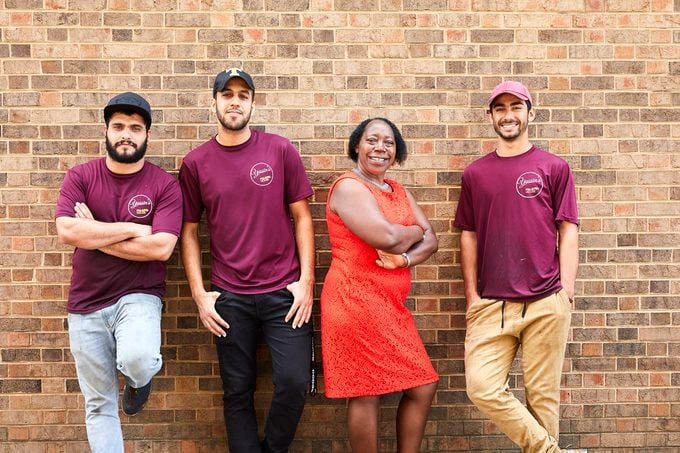
Finding a Nice Place
Like so many who have come to America, Terou was run out of his home because of his beliefs.
Terou was born in Syria in 1983. He grew up in Damascus, the capital, enjoying a quiet, middle-class childhood where he took judo lessons and learned to play the trombone. His father was a lawyer and his mother raised him and his four siblings, working in the home.
In 2010, the secret police in Syria held Terou for a month, taking him away from his public relations job for a locally owned Kia dealership. Every day, he had to report for questions from 8:00 A.M. to 2:00 P.M. Most days, the interrogators would ask him one question and then make him stand in a small room for hours until dismissed. He had been a critic of the government in a place where that’s not a freedom given to citizens. He applied for asylum in America, hoping to return to Syria when he was no longer in danger. But things only got worse, with revolution leading to a war in which some 400,000 people have been killed, according to U.N. estimates. Many people Terou knew are now missing or dead.
Terou came to Knoxville in 2011, knowing little English or much about life in America. Some of our customs were confusing to him—but he knew right away that he was in a nice place. On his first day in town, the locally beloved University of Tennessee’s football stadium was packed for a game. People smiled at him as he passed for no reason he could understand—now he knows that’s just how folks are in Knoxville.
“The overall values of our community is that we’re welcoming,” Knoxville Mayor Madeline Rogero told Reader’s Digest. “There’s a culture of volunteering and giving back.”
But life for Terou in his new home still wasn’t easy. After filing the proper papers to legally obtain employment, Terou couldn’t find work. Who would hire someone who couldn’t speak the language or drive a car? He took his case to the small Muslim community in town, which offered to help him with free food and clothing. But Terou wanted a job. He asked if he could sell sandwiches outside the Mosque on Friday after services. Every week he would sell out of sandwiches. Even locals who didn’t worship at the Mosque were buying them. That’s when Nadeem Siddiqi, Terou’s business partner, knew he was witnessing something special.
“I asked him why he didn’t open up the store,” Siddiqi recalls. “He didn’t have any money, just got here. I had a building downtown and had an empty spot just sitting there, so I thought, why don’t we give it a shot and see how it goes.”
They opened the first location in 2014 and the second in 2018. Two more stores are planned for 2019.
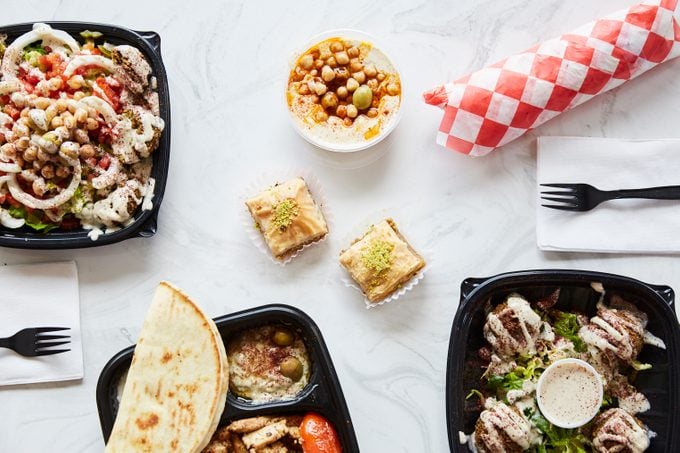
Facing Hate with Love
“A lot of immigrants try so hard to blend in,” Siddiqi said. “Yassin is very much proud of his heritage. He’s grateful and he understands something that’s really important. With a generous spirit and with a generous heart, nobody has a negative feeling toward that.”
Well, not “nobody.”
The morning of Tuesday, February 27, Terou received a disturbing message from a friend: The “Safe Place” sign outside of the downtown Yassin’s location had been vandalized with a white supremacist sticker. The friend, a long-time customer, spotted the hate-symbol sticker and snapped a picture of it to send to Terou before scraping it off. Perhaps Terou would need it to file a police report, he thought.
But he didn’t call the police. He didn’t even think about pressing charges. He did what he has always done when confronted with hate—he countered it with love. Terou gathered customers, many now friends, outside his restaurant and talked about how he wanted to sit down for a meal with the white supremacists who did it, so they could learn to get along.
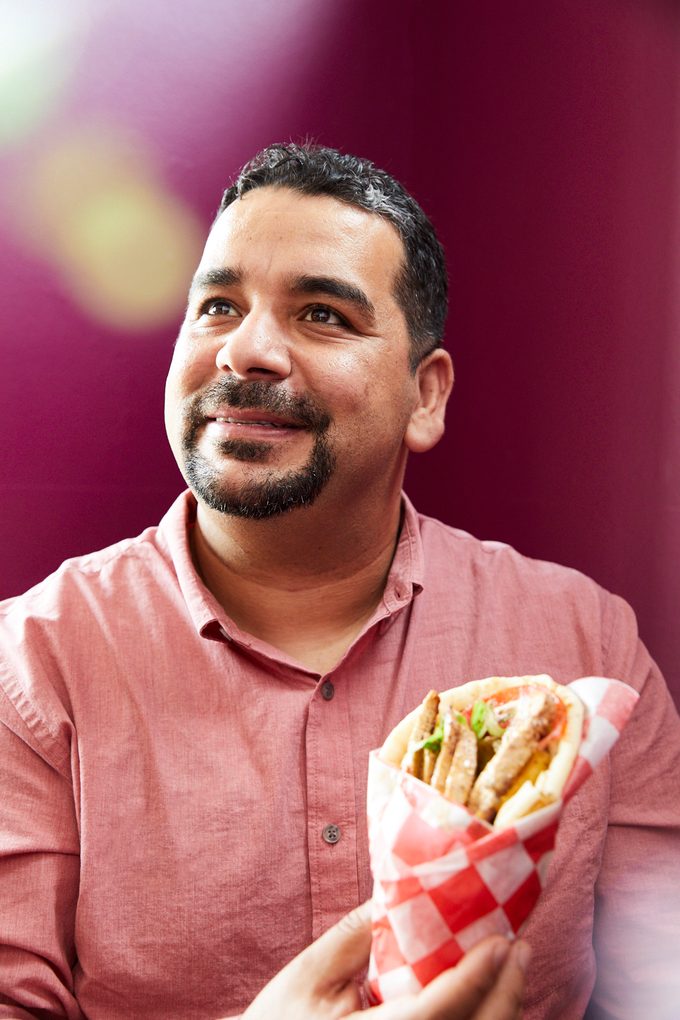
The Heart of Knoxville
It’s no surprise that Yassin’s Falafel House has thrived in a town where people wave at strangers and no car sits broken down for more than a minute or two before passersby stop to help.
The city is also home to Random Acts of Flowers, an organization that recycles flowers from weddings, restaurants, supermarkets, and florists and repackages them for people in hospitals and hospice. The organization is celebrating its 10th year and has expanded to other cities. It will deliver its 500,000th bouquet some time in 2019.
But perhaps the best symbol of the heart of Knoxville is the Unity Ride. In the spring of 2017, as democrats and republicans everywhere grew more divided than ever, Jonathan Williams and Andre Block didn’t like what they were seeing. So Williams, a conservative, and Block, a liberal, decided to ride bicycles across the country together to prove that what unites us as Americans is stronger than what divides us.
The duo traversed 3,200 miles in 35 days, from Oceanside, California, to Washington, D.C., ending on July 4, in time to see the fireworks in the nation’s capital. They talked to people along the way about what they call the “gray area,” the things in the middle that most people want. In a country of more than 300 million individuals, you have to compromise to get along.
“If you want to grow as a person, you need to be around people who are a little different than you; you can’t live in echo chambers,” Williams told Reader’s Digest.
This year, the two again saddled up to promote a message of unity, biking along the underground railroad’s trail, all the way up to Toronto.
This kindness—the idea that just getting to know someone can bring us all closer to peace—is what makes Knoxville the perfect home for Yassin’s Falafel House.
“Yassin is a Syrian refugee, and that unfortunately carries a stigma,” said Pastor Ogburn. “What we know about Syria is what we watch on television and there’s stories of war, conflict, and brutality. But Yassin has managed to help others see the human story. It’s him and his family, it’s not some place far away. It’s real people with real stories and real lives.”
In some ways, Yassin’s Falafel House stands alone as a shining light of what we all want our communities to be like. In other ways, it shares so much in common with nice places all over America, where neighbors are friends and trust and civility are winning. But, for the people of Knoxville, Yassin’s Falafel House is a place to go where you will feel welcomed.
As Siddiqi says, “It’s like Cheers, somewhere where everybody knows your name.”
